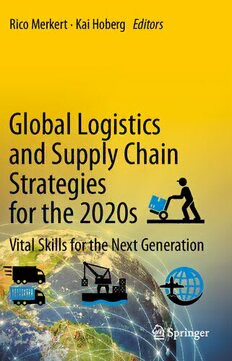
Global Logistics and Supply Chain Strategies for the 2020s: Vital Skills for the Next Generation PDF
Preview Global Logistics and Supply Chain Strategies for the 2020s: Vital Skills for the Next Generation
Rico Merkert · Kai Hoberg Editors Global Logistics and Supply Chain Strategies for the 2020s Vital Skills for the Next Generation Global Logistics and Supply Chain Strategies for the 2020s (cid:129) Rico Merkert Kai Hoberg Editors Global Logistics and Supply Chain Strategies for the 2020s Vital Skills for the Next Generation Editors RicoMerkert KaiHoberg InstituteofTransportandLogisticsStudies SupplyChainandOperationsStrategy TheUniversityofSydneyBusinessSchool KühneLogisticsUniversity Sydney,NSW,Australia Hamburg,Germany ISBN978-3-030-95763-6 ISBN978-3-030-95764-3 (eBook) https://doi.org/10.1007/978-3-030-95764-3 #TheEditor(s)(ifapplicable)andTheAuthor(s),underexclusivelicensetoSpringerNatureSwitzerland AG2023 Thisworkissubjecttocopyright.AllrightsaresolelyandexclusivelylicensedbythePublisher,whether thewholeorpartofthematerialisconcerned,specificallytherightsoftranslation,reprinting,reuseof illustrations, recitation, broadcasting, reproduction on microfilms or in any other physical way, and transmission or information storage and retrieval, electronic adaptation, computer software, or by similarordissimilarmethodologynowknownorhereafterdeveloped. Theuseofgeneraldescriptivenames,registerednames,trademarks,servicemarks,etc.inthispublication doesnotimply,evenintheabsenceofaspecificstatement,thatsuchnamesareexemptfromtherelevant protectivelawsandregulationsandthereforefreeforgeneraluse. The publisher, the authors and the editors are safe to assume that the advice and information in this bookarebelievedtobetrueandaccurateatthedateofpublication.Neitherthepublishernortheauthorsor theeditorsgiveawarranty,expressedorimplied,withrespecttothematerialcontainedhereinorforany errorsoromissionsthatmayhavebeenmade.Thepublisherremainsneutralwithregardtojurisdictional claimsinpublishedmapsandinstitutionalaffiliations. ThisSpringerimprintispublishedbytheregisteredcompanySpringerNatureSwitzerlandAG Theregisteredcompanyaddressis:Gewerbestrasse11,6330Cham,Switzerland We dedicate this book to Prof. Dr. h.c. Klaus-Michael Kühne, in celebration of his 85th birthday and in recognition of his lifetime contribution to the global logistics industry. With over 60 years as a champion of his field, he is a role model as an exceptional benefactor who has furthered the cause of academia to enrich practice in supply chain management and logistics. —Prof Rico Merkert and Prof Kai Hoberg Foreword Business schools around the world have long known the value of teaching global logisticsandsupplychainmanagement(GL&SCM).Thisisbothasectorandafield of study with an exciting and challenging international management dimension. While it is true that freight moves the world, it is also the case that the GL&SCM sectorhasevolveddramaticallyinrecentdecades.Ithasexperiencedbothdisruption and groundbreaking innovation—the latter often arising from the sector’s partner- ship with universities like ours. Logistics and supply chain management has tradi- tionally focused primarily on transportation and warehousing, but today encompasses many different activities that enable the seamless orchestration of material,financial,andinformationflows.Companiescombinetheirownresources withthoseofpartnersandthirdpartiesandleveragecomplexnetworkstoproduce, ship, and distribute their goods across the globe in ways unimaginable just twenty yearsago. The past decade has seen continuous progress and dramatic improvements in global supply chains and logistics that have benefited all stakeholders. End customers can take advantage of new innovative products that are offered at high service levels and low lead times. Companies can draw from a huge portfolio of suppliersacrosstheglobetoleveragetheirspecificskillsandbenefitfromlowcosts. Suppliers can better align their manufacturing schedules with the actual needs of their direct customers based onjust-in-time and just-in-sequenceprinciples.Logis- tics service providers can use their end-to-end visibility in shipping schedules and capacitiestoselectthemostappropriatecarriers. Effortstooptimizesupplychainprocessescontinuedtobearfruituntiltheearly 2020.TheemergenceoftheCOVID-19pandemic,however,changedallourlives: personallyandprofessionally.Thepandemichaddramaticconsequencesforglobal supplychains.Italsounderlinedthefactthatglobalsupplychainsarethebackbone ofmanyindustriesandeconomies.Suddenly,supplychainswereinturmoil.Wesaw unprecedented stockouts and delays everywhere—in Sydney, in Hamburg, and across the globe. Consumers had to confront the reality of empty toilet paper or pasta shelves in supermarkets. Automotive plants were shut down due to a lack of parts. Ports were congested and overwhelmed due to the backlog of containers arrivingatthesametime. vviiii viii Foreword Whatisnowevidentisthatthereisstillmuchworktobedonebycompaniesto optimizetheirlogistics and supply chain activities. It isalso clear that this will not occur without the right logistics and supply chain skills. But that only begs the question: what are the “right” skills? From a business school perspective, this questioncanbereframedintheseterms:inaworldofincreasingautomation,rising concern about sustainability, and rapidly changing ecosystems, what are the skills andqualitiesthatbusinessschoolsshouldseektoinstillintheirgraduateswantingto pursuecareersingloballogisticsandsupplymanagement? Oneofthemanycontributionsofthisbookisthatithelpstoaddressthisquestion. In addition, for those who are seeking to become the next generation of leaders in globallogisticsandsupplychainmanagement,thisbookdrawsontheaccumulated wisdomofthemostrenownedscholarsinthefieldtoprovideinsightsintothesorts ofstrategiesthatfuturetalentmightemploy. Thisbook,then,istimely.Itisamust-readforanyoneinterestedinacareerinthis sector. We are very proud that Professors Rico Merkert and Kai Hoberg brought together such a large and impressive international team of globally recognized academics and leading senior managers to contribute to this book. What could be betterforgraduatesandyoungprofessionalsthanhearingfromthehorse’smouthor, inotherwords,expertsinallthedifferentdisciplinesthattodayareconsideredglobal logisticsandsupplychainmanagement? Ofcourse,itisnotjusttheacademicswhohavecontributedtothisbookbutalso the ecosystems that business schools, such as KLU and the University of Sydney BusinessSchool,provide.Wetraintalenttounlearnoldhabits,tothinkstrategically, andtoturnchallengesonthehorizonintoopportunitiesthatwillresultinvaluefor businessesandwidercommunitiesand,ofcourse,asuccessfulcareerforthosewho arebraveenoughtosetoutononeofthemostexcitingindustriesofthisandfuture decades.Thefirststepintothatsuccessfulfutureistoreadthisimportantbook. Dean,TheUniversityofSydneyBusinessSchool ProfessorGregWhitwell Sydney,Australia President,KühneLogisticsUniversity ProfessorThomasStrothotte Hamburg,Germany Preface Globallogisticsandsupplychainmanagementhaveevolvedinthepastfewdecades from an unpopular and often neglected area to a field that is widely seen as a key enabler of business success. Especially, during the COVID-19 pandemic but also duetodisruptionsandrisingcostsinmanysupplychains,globallogisticsandsupply chain management have not only been rediscovered as a vital sector for many industries and entire economies but also as an industry that is fun and financially worthwhiletostartacareerin. Inthenextdecade,itwillbecomeevenmorecriticaltodesigntherightlogistics and supply chain strategies given potential challenging and disruptive economic, technological (i.e. automation), and sustainability developments. Economic developmentssuchasthefurthergrowthofAsianmarketsincreasedpoliticalfriction across the globe leading to a reversal of globalization (on- and sure-shoring) and strong interest in omnichannel retailing will all require managers to re-shape, refocus, and potentially re-invent their entire supply chains. New technologies such as the Internet of Things, digital manufacturing, or blockchain are emerging quicklyandcould providecompetitive advantagetothosecompanies thatleverage the technologies smartly while managers that do not adopt and embrace change could be left behind. Last but perhaps most important for mankind, sustainability aspects such as low-carbon transportation, closed-loop supply chains, or socially responsible supply chain set-ups will become essential to operate successful in the future. Alltheseaspectswillaffectgloballogisticsandsupplychainsasawholeandalso in different functional areas, such as air cargo, maritime logistics, or sourcing/ procurement. This book aims to dive into several of these functional topics to highlight the key developments in the next decade predicted by leading global expertsinthefield.Supplychainswillbemanagedbyanewgenerationofleaders thatwillneedtobeequippedwithdifferentskillsandaninnovativemindsetthatnot only embraces but also works hand in hand with technology and algorithms. To preparethisnextgenerationofsupplychainleadersinabusinessschool/university environment(producefutureproofgraduates)aswellasinthecontextofcontinuing professional development (enhance skill sets ofcurrent leaders), this book features contributions and key insights of globally leading scholars and senior industry ix x Preface experts. Their forward-looking perspectives on the anticipated trends are aimed at informingthereaderabouthowgloballogisticsandsupplychainmanagementwill evolveinthenextdecadeandwhichgraduatequalitiesandskillswillberequiredto succeedinthe“newnormal”environmentthatwillbecharacterizedbyvolatileand increasinglydisruptedbusinessecosystems. For practitioners and managers, this book aims to offer key insights in terms of what may be the next big thing in this fast-changing industry. For graduates, this bookprovidestipsonwhattostudyandwhatskillsarelikelytobeneededtostarta successful career in logistics and supply chain management. Future scenarios are envisagedtoprovidebothpractitionersandstudentswithinsightsthatwillhelpthem toadaptandsucceedinafast-changingworld. Sydney,NSW,Australia RicoMerkert Hamburg,Germany KaiHoberg Acknowledgments We would like to acknowledge the contribution of the 33 globally recognized academics and 24 senior managers (including their legal departments), as without theirsupportthisbookprojectwouldhavenotbeenpossible.Wearefurtherthankful to the Springer team, in particular Barbara Bethke who has helped us to make this innovativepublicationformathappenatSpringer. xi
